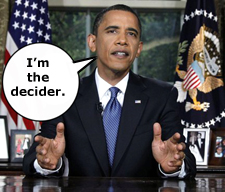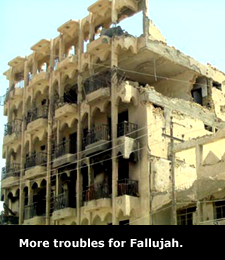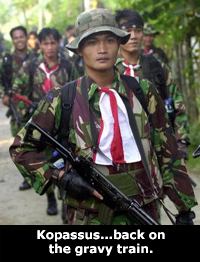President Obama delivered his second address to the nation this past Tuesday, this time on the subject of the “end of combat operations” in Iraq. Here – unsolicited by anyone – are my comments:
Turn the page. President Obama said it was time to “turn the page” on the War in Iraq. Um… not so fast, Mr. President. I know you are obsessed with looking ahead rather than behind, but if everyone took that attitude (say, local law enforcement), no one would be held accountable for anything. This war was caused by people in our own country – people in positions of authority. Your administration has neglected to even examine the record of those responsible for this disaster. This has emboldened them to the point where they regularly flaunt their guilt in public, secure in the knowledge that they will never pay a price for what they did.
Good intentions? At one point, the president said this:
This afternoon, I spoke to former President George W. Bush. It’s well known that he and I disagreed about the war from its outset. Yet no one can doubt President Bush’s  support for our troops, or his love of country and commitment to our security. As I’ve said, there were patriots who supported this war, and patriots who opposed it.
support for our troops, or his love of country and commitment to our security. As I’ve said, there were patriots who supported this war, and patriots who opposed it.
I won’t address the “patriot” issue, since that is such a loaded term. But I can most certainly doubt President Bush’s “support for our troops” without any resort to imagination. He sent them into Iraq to die by the thousand, for no legitimate reason, in pursuit of an illegal and immoral war – a war of choice, no less. He shipped National Guard troops overseas in the ramshackle vehicles they used back home, with no armor, no protection. He is no friend of our soldiers or military families. To suggest otherwise is simply obscene.
Dark creations. The president went on:
Along with nearly 1.5 million Americans who have served in Iraq, they fought in a faraway place for people they never knew. They stared into the darkest of human creations — war — and helped the Iraqi people seek the light of peace.
This passage is worthy of his predecessor. Reading it, one would think we invade Iraq to help the Iraqis. It also, like so much of Bush’s prose, seeks to cloud the notion of agency behind the initiation of the war itself, as if to suggest that our troops went to Iraq on their own initiative to do good works, as if they were Peace Corps volunteers. This is just a rhetorical cop-out, a between-the-lines attempt to deflect criticism away from those who plan the wars by keeping the focus on those sent to fight them.
His call to Bush reminds me of that closing scene in Animal Farm, when Napoleon the pig was having dinner with the farmer and the other barnyard characters, looking on, couldn’t tell one from the other. Such is our ruling class, I suppose.
luv u,
jp

 The “Ground Zero Mosque” Controversy. This is an unexpected bonanza for jihadi recruitment. It validates much of the propaganda about an America at war with Islam. It demonstrates the depth of our political pathology and our willingness to scapegoat more than 1 billion people because of the actions of a handful of criminally insane zealots. And it does so at the worst possible time, when expectations in the Islamic world are already being deflated by Obama’s Bush-like foreign policy. Jihadi leaders hope that this controversy will drag on, I’m sure, or that the Park 51 center will be forced to relocate in Staten Island so that its detractors, flush with victory, will expand their campaign against Muslims.
The “Ground Zero Mosque” Controversy. This is an unexpected bonanza for jihadi recruitment. It validates much of the propaganda about an America at war with Islam. It demonstrates the depth of our political pathology and our willingness to scapegoat more than 1 billion people because of the actions of a handful of criminally insane zealots. And it does so at the worst possible time, when expectations in the Islamic world are already being deflated by Obama’s Bush-like foreign policy. Jihadi leaders hope that this controversy will drag on, I’m sure, or that the Park 51 center will be forced to relocate in Staten Island so that its detractors, flush with victory, will expand their campaign against Muslims.  mortality rates in Fallujah have reached ridiculously high levels in the wake of the U.S. assault, very likely the result of our use of depleted uranium munitions. The casing materials from these armor-piercing shells caused untold misery in Iraq in the years following the Gulf War, during which time essential medical supplies were being withheld from them by virtue of U.S. /U.K. sanctions. (Cockburn’s colleague Robert Fisk tells the story in his book
mortality rates in Fallujah have reached ridiculously high levels in the wake of the U.S. assault, very likely the result of our use of depleted uranium munitions. The casing materials from these armor-piercing shells caused untold misery in Iraq in the years following the Gulf War, during which time essential medical supplies were being withheld from them by virtue of U.S. /U.K. sanctions. (Cockburn’s colleague Robert Fisk tells the story in his book  Such obfuscation is more effective with today’s all-volunteer military, but back when the draft was running at full steam, it was a much harder sell. When you are literally forcing people to go to war, your praise tends to ring a bit hollow. Of course, our volunteer military is forced, technically speaking – they have no choice but to go, even if they merely joined up for the promise of college tuition. But unlike the 60s and prior, this is not a broadly-experienced phenomenon. Back then, masses of young people were threatened with deployment and particularly in the case of Vietnam, many were sent against their will. In that circumstance, there’s a strong incentive to examine the policy very closely. Many did, and didn’t like what they found.
Such obfuscation is more effective with today’s all-volunteer military, but back when the draft was running at full steam, it was a much harder sell. When you are literally forcing people to go to war, your praise tends to ring a bit hollow. Of course, our volunteer military is forced, technically speaking – they have no choice but to go, even if they merely joined up for the promise of college tuition. But unlike the 60s and prior, this is not a broadly-experienced phenomenon. Back then, masses of young people were threatened with deployment and particularly in the case of Vietnam, many were sent against their will. In that circumstance, there’s a strong incentive to examine the policy very closely. Many did, and didn’t like what they found. In a way, the U.S. empire is like this enormous killing machine. It’s got a thousand arms, colossal legs, and it moves across the face of the earth, crushing, grabbing, burning everything in its path. The president sits in a cockpit in its forehead and works the controls. Bush had a great time with it – invited his friends on board, and took it for a tear through Iraq. Then Obama took the helm. He promised to be more responsible. But … it’s still a killing machine, built to do only one thing. No matter what lever you pull, what button you press, it kills. So … he starts pulling, pressing, etc. Kopassus is on the other end of one of those levers, and he’s thinking seriously about pulling that one.
In a way, the U.S. empire is like this enormous killing machine. It’s got a thousand arms, colossal legs, and it moves across the face of the earth, crushing, grabbing, burning everything in its path. The president sits in a cockpit in its forehead and works the controls. Bush had a great time with it – invited his friends on board, and took it for a tear through Iraq. Then Obama took the helm. He promised to be more responsible. But … it’s still a killing machine, built to do only one thing. No matter what lever you pull, what button you press, it kills. So … he starts pulling, pressing, etc. Kopassus is on the other end of one of those levers, and he’s thinking seriously about pulling that one.